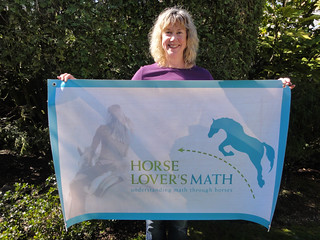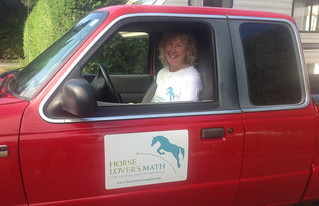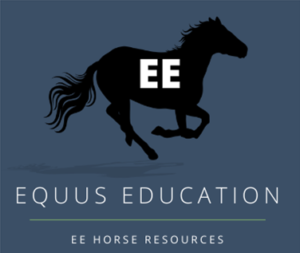Deborah Stacey of Horse Lover’s Math was kind enough to answer some questions about her passion for horses and education.
How much of your day/week is related to horses?
Horse Lover’s Math takes as much time as I can give it. It’s a one-woman project. I do it all from writing a new post each week, to social media, business development, writing and laying out the workbooks, communications, shipping, whatever needs doing. I probably put in about 30 hours a week on average.
While I no longer regularly work with horses, I attend local equestrian events to meet people, get photos and gather background materials for HLM. I also have a friend who owns a boarding/training facility and I drop in there when I need background photos or other materials.
The lower mainland of British Columbia where I live has one of the highest concentrations of horses in Canada. In fact, the Township of Langley is known as the Horse Capital of BC. I’ve gone to a Farm Day event to see and learn about horse plowing, there’s a Standardbred track not far from me and the city of Vancouver has a Thoroughbred track at Hastings Park.
One of the top equestrian event centres in North America is a thirty minute drive away at Thunderbird Show Park. In August last year got a media pass to a Longines FEI World Cup Jumping Series event at Thunderbird. I helped set up the course, and talked with the designer.
A local community college offers a Farrier program. Gerard, the head of the program is very supportive and helpful. So, there are plenty of opportunities to get the first hand information I need to create real world content for Horse Lover’s Math.
Both Western and English riding disciplines are popular in my area. Then, of course there’s Pony Clubs and 4-H.
I’m very grateful that I’ve found a way to follow my passion for horses in what is quite a unique way. I want to let kids see that they don’t have to own their own horse or be a great rider to have a career with horses.
Academics can be a way of making a career for yourself with horses.
What is it exactly that you do?
My day starts on the computer doing research, answering and initiating correspondence, and keeping the HLM social media sites alive. After that I’ll work on content, whether it’s a post for the website, writing new pages for the next workbook, designing marketing materials, that sort of thing.

Once a week I volunteer at my local elementary school helping out in math class. I love kids and it helps me stay in touch with the kids of today and how math is being taught in the classroom. It’s very different from when I was in elementary school! There is now a huge emphasis on understanding and mathematical thinking.
In your HLM related tasks, is it possible to be a full time professional and earning a liveable income?
I certainly hope so. This is what I’m working towards. I love what I’m doing but I do need to pay the bills.
What are the general steps you took to develop HLM?
Growing up, I was a horse crazy girl. I read every horse book I could get my hands on, watched each episode of Fury and My Friend Flicka on TV and collected every horse picture, model and magazine that crossed my path. If I was lucky, a few times each summer I would have a chance to ride a real horse at a dude ranch or farm.
While still in elementary school, a friend and I organized our own horse school where we taught each other, taking turns being teacher and pupil. We wrote on a chalkboard, gave lectures and tests.
The fascination with horses remained strong through high school. After graduation I decided to pursue my passion and began working with horses at a small, private hunter and jumper stable outside of Montreal.
Humber College in Toronto started up a horsemanship program at this time and I attended the two-year program, graduating with an Honours Degree in Horsemanship in the mid-seventies.
For years I worked in the horse industry, on hunter/jumper/breeding farms, in boarding operations, in dressage. As much as I loved horses, I just could not find a way to earn a decent living. Between that and the way horses are sometimes treated in the industry, I couldn’t see a place for myself.
Years later, when my daughter was in elementary school we lived on a horse farm. I’d found a position at a bustling dressage/lesson barn and my horse crazy daughter was in heaven. But in school, she struggled with math.
One evening, while helping her with math homework, I could see that the question could easily be changed to reference the world of horses. Instead of ‘Sally receives an allowance of $35 each month. How much money does she receive in a year?’ I wrote, ‘Sally pays $250 each month to self-board her pony at a nearby farm. How much does it cost to board her pony for the entire year?’

This is a realistic amount to pay for self-boarding a horse in our area so while the mathematical operations of the question were the same, my daughter gained a sense of the actual cost to board a pony per month and for an entire year.
Using the math work sheets my daughter brought home from school as reference, I began creating math questions based in the real world of horses. Suddenly, I began seeing math everywhere in my work with horses, and I found my place in the horse world.
Future goals?
I want to volunteer at a local horse rescue or horse therapy facility on a regular basis. I’ve taken one online math course offered by Stanford University and hope to take more. I came across one for teachers recently on teaching fractions, but the timing didn’t work for me.
I am working towards having a display booth organized for attending events, both equine and educational, to let people know about Horse Lover’s Math. I’d love to someday have an app or HLM game, and have the site more interactive.
I’m looking to offer more products for sale as well. I have a t-shirt design and will be putting together a calendar at some point.
Best thing about HLM?
The best thing about Horse Lover’s Math is the learning involved, both mine and the kids using the content. When I get comments like this, “Horse Lover’s Math has helped me recognize how important math is and also has made math much more fun!” from a math club member I feel grateful.

Leave a Reply